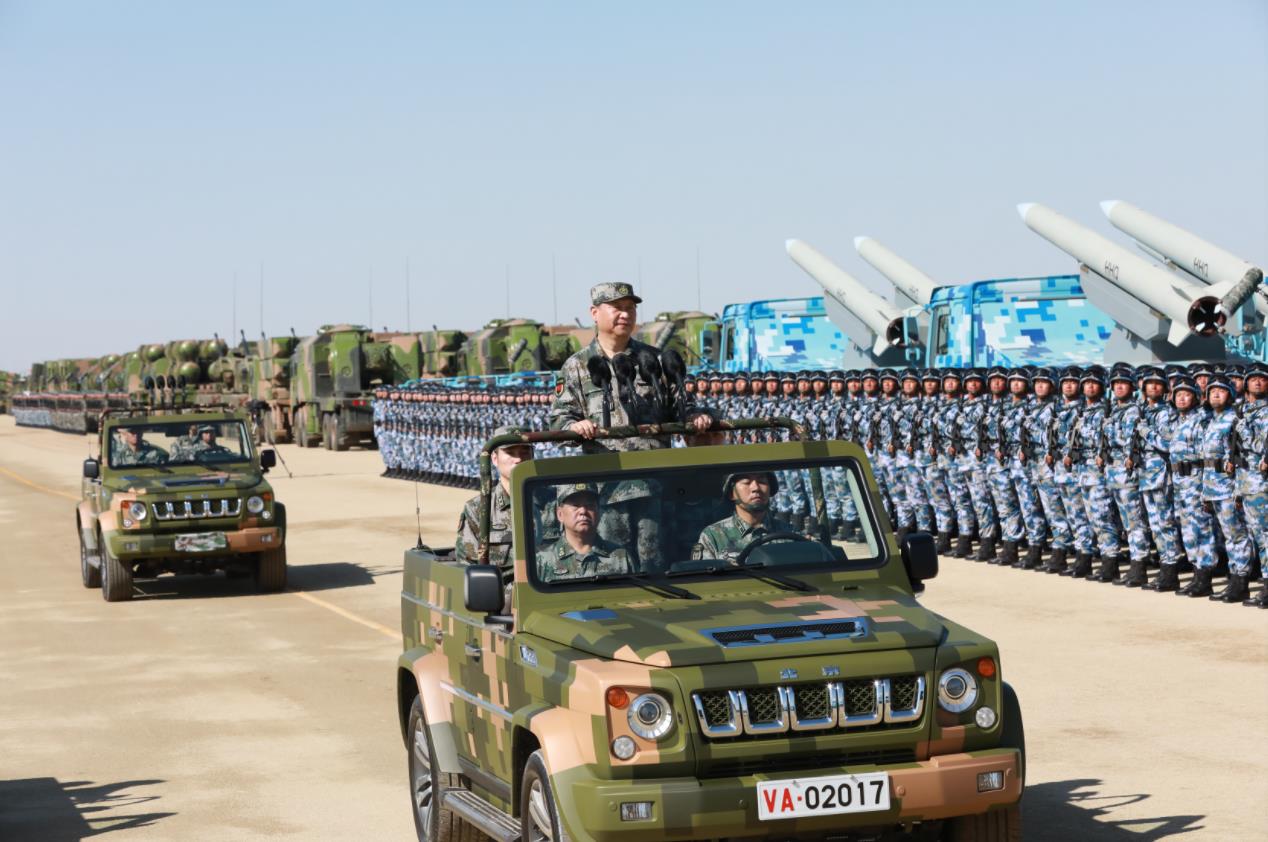
New York Times reports that China's president, Xi Jinping, has opened a public campaign to deepen his grip on power in a coming leadership shake-up, using a huge military parade on Sunday, speeches and propaganda, along with a purge in the past week, to warn officials to back him as the nation's most powerful leader in two decades. Wearing his mottled green uniform as commander in chief of the People's Liberation Army, Mr. Xi watched as 12,000 troops marched and tanks, long-range missile launchers, jet fighters and other new weapons drove or flew past in impeccable arrays. Mao famously said political power comes from the barrel of a gun, and Mr. Xi signaled that he, too, was counting on the military to stay ramrod loyal while he chooses a new leading lineup to be unveiled at a Communist Party congress in the autumn...Officially, the display was to celebrate the 90th anniversary of the creation of the People's Liberation Army. But it was also the highlight of a week of political theater promoting Mr. Xi as a uniquely qualified politician whose elevated status as China's "core" leader, endorsed by officials last year, should be entrenched at the party congress. "These military parades could become a regular, institutionalized thing, but this one also has a special meaning this year," said Deng Yuwen, a former editor at a party newspaper in Beijing who writes current affairs commentaries. "It's meant to show that Xi Jinping firmly has the military in his grip, and nobody should have any illusions of challenging him."
Bloomberg comments that for decades, China has sought to expand its "soft power," or the ability to extend influence through non-military means. It spends some $10 billion a year promoting language schools and building universities overseas. It's pushing entertainment companies to expand in foreign markets. And it has long been hoping to lure foreign travelers, just as the U.S. and Europe do. State media have said that the plan is to "develop tourism into a major driver of economic transformation and upgrading." But that effort is faltering: Inbound tourism last year rose by only 3.8 percent, with roughly 80 percent of those visitors coming from Hong Kong, Macau or Taiwan. One reason is that, for all its global aspirations, China isn't at all welcoming to foreigners. Its visa process offers a case in point. Citizens of only 13 countries are allowed visa-free entry to China (compared with 38 countries allowed by the U.S.). Everyone else must obtain a visa in advance. In the U.S., Chinese visa centers have the foot traffic associated with a Lunar New Year festival. Such restrictions create significant economic barriers. One recent study found that a visa requirement for a given country will reduce inbound travel by 70 percent. In 2015, mainland China received just 2 million visits from Americans. By comparison, Hong Kong -- which makes up less than 3 percent of China's gross domestic product and less than 1 percent of its population -- received 1.8 million visits...Solving these problems will be politically difficult. But one obvious step for China is to simplify its visa system.
- 2017-07-28 Value of U.S. deals in China sinks on rising trade tensions
- 2017-07-27 U.S. Pacific Fleet commander: I'd launch nuclear strike against China if Trump ordered it
- 2017-07-26 US and China report progress on new North Korea sanctions
- 2017-07-25 China fires back at US accusations over aerial encounter
- 2017-07-24 In China, Herd of "Grey Rhinos" Threatens Economy
- 2017-07-23 Op-Ed: China will cooperate to narrow US trade deficit
- 2017-07-21 China's navy expands reach: Ships in Baltic for drills with Russia
- 2017-07-20 Trade talks fizzle as China rebuffs key Trump team demand
- 2017-07-19 U.S., China talks seen offering small-scale market access deals
- 2017-07-18 How to persuade China to abandon North Korea
- Wall Street Journal China's New Missile a Warning to Rivals Abroad—and at Home
- Wall Street Journal US Presses China on North Korea Threat
- Financial Times Trump lashes out at China after North Korean missile launch
- Reuters China must decide on further action against North Korea: US ambassador to UN
- Reuters US flies bombers over Korean peninsula after North Korea missile test
- CNBC As Trump fumes, experts warn that an answer to the North Korea crisis won't come through China
- CNN US tests defense system after North Korea missile launch
- Financial Times China manufacturing, services growth softens in July
- New York Times Real Estate Booms in China's Small Cities, but Construction Outpaces Demand
- Reuters Sri Lanka signs $1.1 billion China port deal amid local, foreign concerns
- Financial Times Apple removes apps used to bypass Chinese censors
- New York Times China Shows Off Military Might, and Xi Jinping Puts Rivals on Notice
- Reuters China demotes work safety chief for "discipline" problems
- New York Times In China, Designer Goods Delivered to Your Doorstep
- The Washington Post UFC headed to China for the first time for November card
- Reuters Trump, in tweets, says he is "very disappointed" in China
- New York Times We Need a Radical New Approach on North Korea
- Foreign Affairs Israel and Japan's Rising Sun Relations
